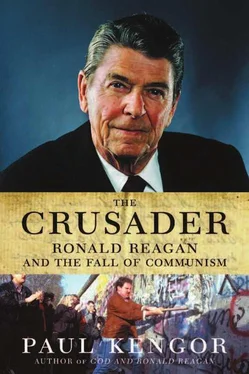A common Reagan speech in the early 1960s, which he gave innumerable times, was one he titled, “A Foot in the Door,” which warned of Communists trying to surreptitiously subvert institutions like the motion-picture industry. In one version of the speech, he again used the Lenin-Marx quote on “one or the other must conquer.” Also in this speech is a quote attributed to Lenin about Latin America falling into Communist hands like “overripe fruit,” which Reagan cited for decades to come, including during his presidency, though it was likely not a direct Lenin quote, even if accurate in spirit. 22
While much of this anti-Communist campaigning took place as Reagan was a Democrat, as the 1960s progressed he found himself growing more and more disillusioned with the direction of the party. In his estimation, the party had abandoned traditional ethics and values in favor of big government solutions to problems. He felt that liberal Democrats had created a permanent welfare state that (in his view) FDR would not have supported; such a system was fostering a “dependency class.” Rather than scaling back that system, Reagan saw that the party was committed to a huge expansion of government under LBJ and his Great Society. Reagan feared a “creeping socialism” under a party that he suspected was increasingly naïve to the dangers of Communism, and in 1962, he switched to the Republican Party.
The GOP was happy to have him. Then, on October 27, 1964, he was asked to speak on behalf of Senator Barry Goldwater (R-AZ), the Republican presidential nominee. In this speech, which would come to be known as the “Time for Choosing” speech, Reagan declared, “We are at war with the most dangerous enemy that has ever faced mankind in his long climb from the swamp to the stars, and it has been said that if we lose that war, and in so doing, lose this way of freedom of ours, history will record with the greatest astonishment that those who had the most to lose did the least to prevent its happening.” 23He vowed to do something; the will was there; the specific policies and plans would need to wait for a while.
This speech for Goldwater became an instant landmark and a focal point for Reagan’s political support. Republicans everywhere immediately urged him to run for office, something that took him by surprise but invigorated him nonetheless. “I had never given a thought to public office,” he later claimed, recalling the reaction to the speech. “I was happy to be in show business. They kept after [us] till Nancy and I were having trouble sleeping. I thought they were crazy.” 24
This shift in horizons could not have come at a better time. By 1964, the GE tours had ended, but Reagan continued to search out more forums for warning the world about Marxism. To that end, he opted for what he knew best—a camera and the spoken word—producing two documentaries. One was a two-part 1963 film titled “The Truth About Communism,” which he hosted and narrated, focusing on the Hitler-Stalin Pact, the Comintern, the massacre in Poland’s Katyn Forest, Moscow’s desire for world revolution, the words of Marx in the Communist Manifesto, and much more. 25The second documentary, released in 1965 and conarrated with friend and actor Robert Taylor, was called “Let the World Go Forth.” 26Both were intended to “wake up” the world to the threat emanating from Moscow. Not only did these documentaries embody Reagan’s anti-Communist ideology, but they also represented the marriage of his two passions: film and politics.
But by the mid-1960s, it was becoming increasingly clear that while one passion was coming to a close, the other was just beginning to take off. Reagan’s speech for Barry Goldwater thrusted his views into the national arena in a once unthinkable manner, and now it was time for him to stop commenting on politics and start doing them.
Hollywood had given Reagan the notoriety and platform to make these robust, hard-hitting statements, statements that would come to define him both politically and personally. While his showbusiness background would be the object of ridicule during his eventual presidential campaigns, it was this background that provided him with the experience he needed to begin his political career. Indeed, the irony was that despite the claim that his Hollywood background deemed him unworthy of Oval Office stature, it was this very thing that gave him the name recognition, confidence, and even some of the leadership experience that he needed to be president. Lew Uhler, who as a member of the Counter-Intelligence Corps reported on Communist infiltration in the Los Angeles area in the 1950s, and later worked for Reagan in Sacramento, shrewdly observed that only an individual who came through the crucible of combating Hollywood Communists on a daily basis—and in the manner in which Reagan clashed with and defeated them—could in turn appreciate the strengths and weaknesses of Communists generally. 27That experience would be indispensable when Reagan got to Washington and formally commenced his Cold War crusade.
Reagan had fought the nation’s chief enemy on the home front for over twenty years, but now recognized that it was finally time to take his views to a new stage, a stage where he could impact Communism with more than mere words, a stage that would eventually help make him president.
4. Cold War Governor: Late 1960s
AFTER HIS SPEECH ON BEHALF OF BARRY GOLDWATER, IT WAS clear that there was a lot of Republican support for Ronald Reagan and his ideas. Yet, questions lingered over the best way for the party to capitalize on this newfound enthusiasm. While some members of the Reagan bandwagon looked to the national stage, it was obvious that their guy would need some elected experience outside of Washington before he could advance to the presidency. Accompanied by a coterie of conservative California businessmen, Reagan explored possibilities at the state level, where his next move soon became apparent.
As the nation’s most populated state, with the largest budget and plenty of problems, not to mention millions of people who had welcomed into their homes the friendly host of GE Theatre, the California governorship was ripe for the picking. And though Reagan’s driving concern was perched much farther away, in Moscow, he was quite interested in domestic politics. California could be a microcosm, a laboratory, for his domestic conservatism, giving him an opportunity to develop policy and score some legislative bona fides for his political resume. It was a plan that seemed seamless, if not for an obstacle that stood in the way: The current governor, Pat Brown, was a popular incumbent. Reagan decided to run regardless, sure of his chances, and his destiny.
Reagan laid out that sense of destiny in a 1965 memoir. While the book voiced many of Reagan’s ideas from past speeches, it also gave him the opportunity to express himself in yet another new medium and to appeal directly to voters in California and around the country. Titled, Where’s the Rest of Me?, the book finished with a revealing flourish. In its final paragraphs, which borrowed from his 1960s speeches, including the “Time for Choosing” speech, lay the logic that compelled him to forcefully reject the coming policy of détente that propelled him to pursue the presidency. Displaying the crisp anti-Communism which would come to define many of his stances toward the USSR, he charged that a “policy of accommodation is appeasement, and appeasement does not give a choice between peace and war, only between fight and surrender.” He went on:
We are told that the problem is too complex for a simple answer. They are wrong. There is no easy answer, but there is a simple answer. We must have the courage to do what we know is morally right, and this policy of accommodation asks us to accept the greatest possible immorality. We are being asked to buy our safety from the threat of the [atomic] bomb by selling into permanent slavery our fellow human beings enslaved behind the Iron Curtain. To tell them to give up their hope of freedom because we are ready to make a deal with their slave masters. 1
Читать дальше












